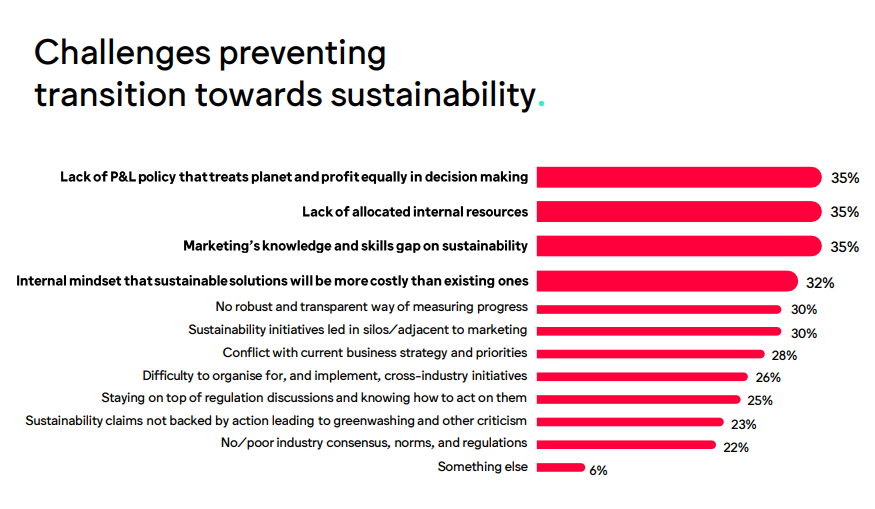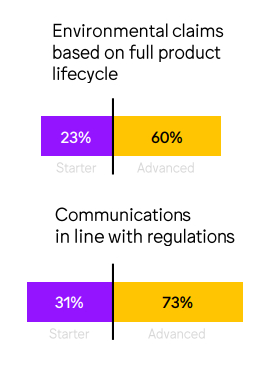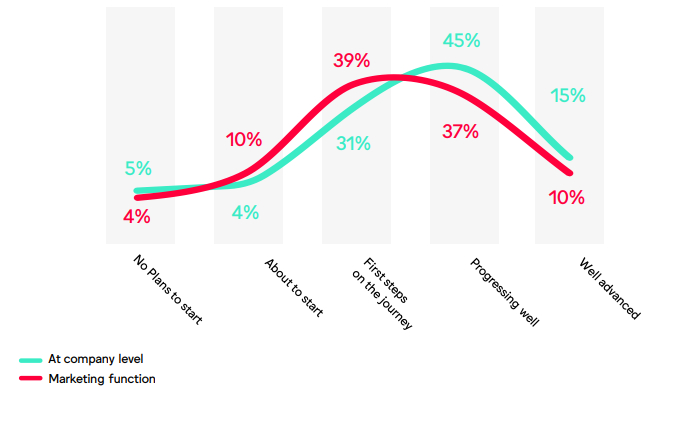Despite growing enthusiasm for sustainability initiatives in marketing circles, the disparity between action and intention persists, with advertisers still seeking resources and education on implementing sustainability plans. However, that gap is slowly narrowing, as shown by the World Federation of Advertisers’ (WFA) latest report.
Conducted in partnership with Kantar, WFA’s Sustainable Marketing 2030 depicts an advertising industry taking the first steps on its sustainability journey but ultimately not moving fast enough. Based on responses from 938 marketers across 48 countries, alongside input from global CMOs and sustainability experts, the research finds 90 percent of advertisers agreeing that sustainability programmes need to be more ambitious. But with 39 percent just starting out on those agendas, there are clearly barriers to be addressed.
The report identified the key challenges cited by marketers, with 35 percent of respondents highlighting a lack of internal resources, knowledge and skills gaps, and the absence of a P&L policy that puts the planet on equal footing with profit. Meanwhile 32 percent reported an internal perception that sustainable solutions are too costly, and 30 percent said they lack a robust way to measure progress.
Progress and trepidation
When compared with WFA research from 2021, the results are a mixed bag. In a mark of progress, 41 percent now have a sustainability story they are proud to communicate, rising from 25 percent two years ago. And 43 percent of brands have added sustainability as a KPI in their marketing dashboards, an increase on 26 percent in 2021.
But those saying they lack the requisite knowledge to address the need for transformation has actually risen to 35 percent, up from 20 percent in 2021. On a positive interpretation, this suggests an acknowledgement of the growing complexity around sustainability, with marketing practitioners reluctant to blindly wade into these issues.
The topic of greenwashing provides a clear sign of trepidation in the industry, as 39 percent of marketers call for an industry-level consensus in how to manage the risk of greenwashing. In Europe, where regulation is stricter than other regions, there is a greater fear of greenwashing accusations; 27 percent of European advertisers report these concerns, compared with 23 percent globally.
As greenwashing rulings have shown, environmental claims must take into account the entire lifeycle of a product, or risk buckling under scientific scrutiny. According to the research, 60 percent of “advanced” marketers (in terms of their progress in the field of sustainability) are able make these claims sufficiently robust, but just 23 percent of “starters” have that capability.
And the issue of waste in the supply chain also requires rethinking, the WFA found. The report showed that 74 percent of marketers focus on “downstream” innovation, meaning they deal with waste once it has already entered the system. Only 47 percent favour “upstream” innovation, preventing waste from entering the pipes in the first place. “By treating the root issue rather than the symptoms, we can prevent waste from ever being created,” said the report.
Perception and communication
The study notes the role of marketing in the ever-pressing need for sustainable practices. “Marketing has the opportunity to put itself back in the driving seat of business performance,” said the report. “We have the imperative and the unique skillset to lead this era of transformation but we are currently moving too slowly and lack the necessary ambition.” The findings show marketing lagging behind company-level progress on sustainability; 45 percent of respondents said their company was “progressing well”, but the marketing function was behind at 37 percent.
Part of the reason for this shortfall appears to be the perception of sustainability as expensive, and therefore in conflict with business decisions. “The study surfaces a discrepancy between investment decision-making and P&L incentivisation,” found the report. While 58 percent of the advanced group claim to take the planet into their investment decisions, this drops to 17 percent for the starter subset.
The WFA argues that repositioning sustainability at the heart of communications, rather than a point of conflict with business outcomes, creates a wealth of marketing opportunity. By communicating and normalising sustainable lifestyles, marketers have the ability to help drive transformation, and 54 percent of respondents agreed that marketing should educate people about their choices and actions.
“Marketers are finally starting to grasp the scale of the sustainability challenge, particularly the climate crisis,” said WFA CEO Stephan Loerke. “We have reached the point where the status quo is no longer an option. Radical transformation is essential. We passionately believe that marketers are uniquely placed to drive the change we need on account of their unique creativity, innovation and communication skillset.”








